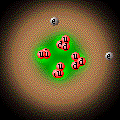 PHYS 351
M O D E R N P H Y S I C S FALL 2010
PHYS 351
M O D E R N P H Y S I C S FALL 2010 PHYS 351
M O D E R N P H Y S I C S FALL 2010
PHYS 351
M O D E R N P H Y S I C S FALL 2010Text Book: Nonclassical Physics by Randy Harris (19990 .
A supplementary recommended website that has web-based interactive exercises with live simulations (physlets)
Modern Physics Noted from UVA that supplement this course .
Professor: Dr. Mesgun Sebhatu, 203 Sims Bldg. Office hrs: 10-10:50 MWF or by appointment
Tel: 803-323 - 4935(Office) E-mail: sebhatum@winthrop.edu
Modern physics refers to physics developed in the 20th century. It includes, the special and general theory of relativity, quantum theory, as well as nuclear and particle physics. These topics are challenging both conceptually and mathematically. They are, however, the basis for all the technological wonders and scientific developments we see and hear about. A course in modern physics is indispensable for any one contemplating a career or profession in the sciences and engineering. The major objective of the course is to provide a student majoring in the physical sciences a mastery of the basic concepts in relativity and quantum physics and explore some of its applications in various fields.
Tentative Course Outline and Test Schedule
IA. Special Relativity - Lorentz Transformation(1.1 to 1.7)
HW1: Read Sections 1.1 to 1.8. Make Sure you understand the two postulates of Special Relativity and all the worked examples for section1.1 to 1.8
Do the following selected problems clearly and Hand in the net two weeks: Ch1. 1, 2, 3, 13,15,20,21,22,28,29,34,39,38. Please show your detailed work.
IB Special Relativity - Dynamics (1.8-1.13)
Test #1: Monday Sept. 18(Chapters 0, 1 and 2)
II. Quantum Mechanics I: Quantization of Charge, Light and Energy (Ch. 3), The Nuclear Atom( Ch.4),
and The Wave Properties of Particles (Ch. 5)
Test #2 : Friday Oct. 15 Schrödinger equation in ( Chapters 5,6 and 7 ) , Statistical Physics ( Ch. 8)
III. Quantum Mechanics II (Chapters 6, 7, and 8 )
Test #3: Wednesday Nov. 17 (Chapters 6, 7, and 8)
IV. Atomic, Nuclear and Particle Physics (Ch. 11,12,and 13)
Ch. 14 --Astrophysics and Cosmology will be assigned for reading and it will be discussed in class if time permist.
Test #4: Friday Dec. 3. (Chapters 11,12,13 and May be 14)
A comprehensive final on parts I to IV. Friday, Dec. 10 8:00 -- 10:00 AM
Computation of Final Grades : The best three test grades will contribute 16.67% each (total from tests = 50%). Homework grades will contribute 20%. The comprehensive final will contribute 30%.
50%(3 Tests) + 20%(Homework) + 30%(final) = 100 %
Even though class grade distribution affects the assignment of the letter grades, usually above 90% is an "A", 80% - 89% is a "B", 70% - 79% is a "C", 60% - 69% is a "D", and below 60% is an "F".
Make Up Tests: If a student misses one test, he obtains a "0" for it and loses the opportunity to have his worst test score dropped. It will be dangerous to miss more than one test. There are no provisions for make up tests under normal circumstances.
Class Attendance Policy: The attendance policy followed in this course is the same as that which appears on the current Winthrop University Catalog. Briefly, "If a student's absences in a course total 25% or more of the class meetings for the course, the student will receive a grade of N, F, or U, which ever is appropriate." Please read your catalog for details. In a small class such as PHYS 301, the professor will be able to see who is absent. There will be no need for formal roll call. Students who leave early or come excessively late for reasons not clear to the professor will be marked absent.